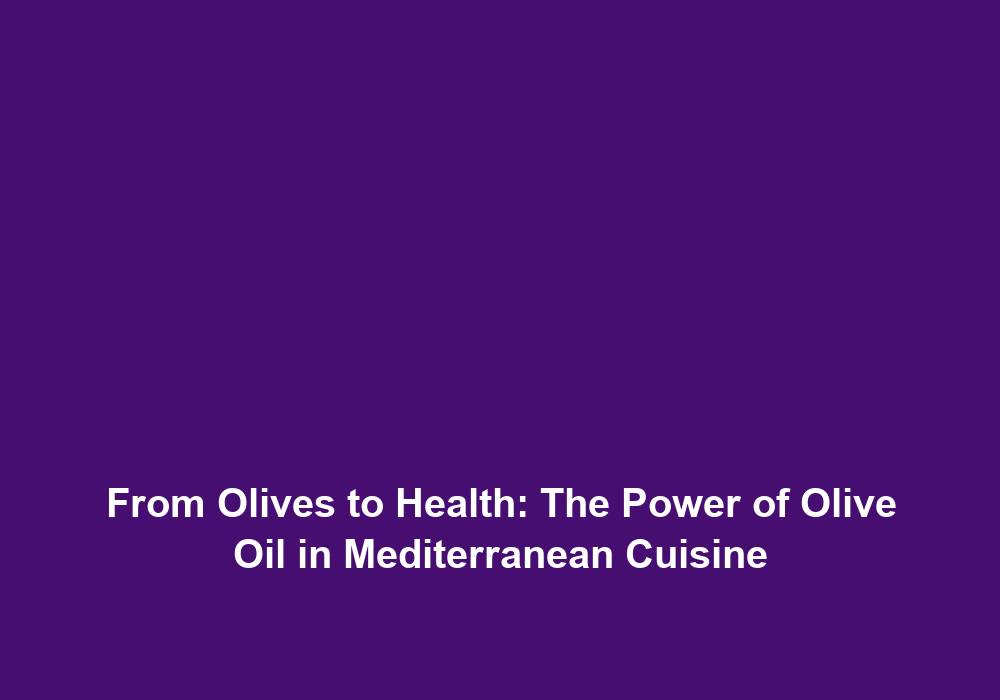From Olives to Health: The Power of Olive Oil in Mediterranean Cuisine
Olive oil has long been recognized as an essential ingredient in Mediterranean cuisine. Its rich flavor and numerous health benefits have made it a staple in both traditional and modern cooking. In this article, we will explore the various aspects that make olive oil a powerful and versatile ingredient in Mediterranean dishes.
The History of Olive Oil
Olive oil has a fascinating history that dates back thousands of years. It was first cultivated in the Mediterranean region, where it quickly became an integral part of the culinary culture. Ancient civilizations, such as the Greeks and Romans, revered olive oil for its medicinal properties and used it in various aspects of their daily lives, including cooking, skincare, and religious rituals.
The production of olive oil has been passed down through generations, and today, it continues to be a cherished tradition in Mediterranean countries. The cultivation of olive trees, the careful harvesting of olives, and the extraction of oil have remained largely unchanged, preserving the authenticity and quality that has made Mediterranean olive oil renowned worldwide.
The Production Process
Producing high-quality olive oil involves a meticulous process that ensures the preservation of its flavor and health benefits. Olives are harvested by hand or by using mechanical equipment, then carefully selected for their ripeness and quality. This attention to detail is crucial as the quality of the olives directly impacts the flavor and aroma of the resulting oil.
Once the olives are selected, they are crushed or pressed to extract the oil. This extraction process must be done with precision to avoid any damage to the olives or degradation of the oil. The resulting olive oil is then separated from the water and solids through a centrifuge or pressing method.
To ensure the highest quality, the extracted olive oil undergoes rigorous testing for acidity levels and other quality parameters. These tests determine the classification of the oil, such as extra virgin, virgin, or refined. Only oils that meet the strict standards set by regulatory bodies can be labeled as extra virgin olive oil, the most prized and flavorful type.
The Types of Olive Oil
There are several types of olive oil available, each with its own characteristics and uses. Understanding the differences between these types can help you choose the most suitable one for your culinary needs.
-
Extra Virgin Olive Oil: This is the highest quality and most flavorful type of olive oil. It is made from the first pressing of the olives without the use of heat or chemicals, preserving its natural flavors and nutrients. Extra virgin olive oil has a low acidity level and is often used as a finishing oil or in dressings and marinades.
-
Virgin Olive Oil: Like extra virgin olive oil, virgin olive oil is made solely by mechanical means. However, it has a slightly higher acidity level, which gives it a milder flavor compared to extra virgin olive oil. Virgin olive oil is suitable for cooking and baking, adding a delicate taste to your dishes.
-
Refined Olive Oil: Refined olive oil is made by refining virgin olive oil, removing any impurities or defects. It has a milder flavor compared to extra virgin or virgin olive oil, making it a good option for high-temperature cooking methods such as frying or roasting. Refined olive oil has a higher smoke point, which means it can withstand higher cooking temperatures without breaking down.
-
Olive Pomace Oil: Olive pomace oil is extracted using solvents and heat from the pomace, the leftover residue after the initial pressing of the olives. It is commonly used in commercial cooking or as an ingredient in processed foods. Olive pomace oil has a neutral flavor and a higher smoke point, making it suitable for deep frying or sautéing.
By understanding the characteristics of each type of olive oil, you can make informed choices when selecting the right oil for your cooking needs. Experimenting with different types can also add depth and complexity to your dishes.
Health Benefits of Olive Oil
Olive oil is not just a delicious culinary ingredient; it also offers numerous health benefits. The Mediterranean diet, which is rich in olive oil, has been associated with a reduced risk of various chronic diseases, including heart disease, type 2 diabetes, and certain types of cancer. This diet is characterized by a high consumption of fruits, vegetables, whole grains, legumes, and healthy fats, with olive oil being a primary source of fat.
The health benefits of olive oil can be attributed to its unique composition. It is rich in monounsaturated fats, specifically oleic acid, which is known for its positive effects on heart health. These fats help lower bad cholesterol levels and reduce inflammation in the body, reducing the risk of heart disease.
Additionally, olive oil is a good source of antioxidants, such as vitamin E and polyphenols. These antioxidants help protect the cells from oxidative stress, which is linked to chronic diseases and aging. Studies have shown that the antioxidants in olive oil have anti-inflammatory properties, contribute to improved brain health, and may help reduce the risk of age-related cognitive decline.
Incorporating olive oil into your diet can also aid in weight management. The monounsaturated fats in olive oil provide a feeling of satiety, helping to control appetite and prevent overeating. It can be a healthier alternative to other cooking oils and fats, as it is low in saturated fats and cholesterol.
Culinary Uses of Olive Oil
Olive oil’s versatility in the kitchen is unmatched. Its distinct flavor profile and ability to enhance other ingredients make it a favorite among chefs and home cooks alike. Here are some of the culinary uses of olive oil:
-
Cooking Oil: Olive oil can be used as a cooking oil for sautéing, stir-frying, or pan-frying. Its high smoke point allows it to withstand higher temperatures without breaking down, making it suitable for various cooking methods.
-
Salad Dressing: Olive oil is a classic choice for salad dressings. Its fruity aroma and rich flavor add depth to simple salads. Combine it with vinegar or citrus juice, herbs, and spices to create delicious dressings.
-
Marinades: Olive oil is often used as a base for marinades, adding flavor and moisture to meats, poultry, and fish. Combine it with herbs, spices, and acidic ingredients like lemon juice or vinegar for a flavorful marinade.
-
Finishing Oil: Drizzling olive oil over cooked dishes just before serving adds a final touch of richness and flavor. This technique is commonly used in Mediterranean cuisine to enhance the taste of roasted vegetables, grilled meats, or soups.
-
Baking: Olive oil can be used as a healthier alternative to butter or other oils in baking. It adds moisture to cakes, bread, and pastries, giving them a unique taste and texture.
Tips for Buying and Storing Olive Oil
To fully enjoy the flavors and benefits of olive oil, it is crucial to choose the right product and store it properly. Here are some tips to help you make the best choices:
-
Choose Reputable Brands: When purchasing olive oil, opt for reputable brands or local producers known for their quality. Look for labels that indicate the olive oil’s origin, the type of olives used, and the extraction method. This information can give you insights into the authenticity and quality of the oil.
-
Look for Extra Virgin Olive Oil: Extra virgin olive oil is the highest quality and most flavorful type. Look for olive oils that are labeled as “extra virgin” to ensure you are getting the best product. It should have a fruity aroma, a golden-green color, and a distinct peppery taste.
-
Check the Harvest Date: Olive oil is best consumed within one to two years from its production date to ensure optimal quality and taste. Check the label for the harvest date or the “best by” date to ensure freshness.
-
Store Properly: To preserve the freshness of olive oil, store it in a cool, dark place away from heat, light, and air. Avoid keeping it near the stove or in transparent containers that expose it to direct sunlight. Exposure to heat, light, and air can cause the oil to deteriorate and lose its flavor and health benefits.
By following these tips, you can ensure that you are buying and storing olive oil in the best possible way, preserving its quality and enjoying its flavors to the fullest.
In Conclusion
From its ancient roots to its modern-day popularity, olive oil remains a prized ingredient in Mediterranean cuisine. Its unique flavor, versatility, and health benefits make it a must-have in any kitchen. Whether used in cooking or as a finishing touch, olive oil adds a touch of Mediterranean charm to every dish it graces. So, embrace the power of olive oil and explore the wonders it can bring to your culinary adventures.







